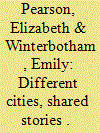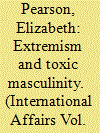|
|
|
Sort Order |
|
|
|
Items / Page
|
|
|
|
|
|
|
| Srl | Item |
| 1 |
ID:
167442


|
|
|
|
|
| Summary/Abstract |
Decimation is a notorious punishment inflicted by the Roman army. One tenth of a unit accused of cowardice or gross dereliction of duty was chosen by lot and beaten to death (fustuarium) by the rest of the legion. It is traditionally viewed as a method of instilling discipline through fear, but in practice rarely occurred. This paper reexamines decimation using modern “primary group” theory. It concludes that decimation was not a destructive force but a healing one. It reintegrated offending units through collective acceptance of both guilt and the necessity for punishment.
|
|
|
|
|
|
|
|
|
|
|
|
|
|
|
|
| 2 |
ID:
148977


|
|
|
|
|
| Summary/Abstract |
In 2015, UN Security Council Resolution 2242 advocated deliberate outreach to women when devising counterterrorism projects. This is based on assumptions of the need to empower women, as well as their particular ability to exert benign influence over young people and stop radicalisation to violence. The approach has been particularly prevalent in Western Countering Violent Extremism (CVE) projects aimed at preventing homegrown Islamist radicalisation. On the basis of fieldwork with Muslim communities in five countries – Canada, the UK, Germany, France and The Netherlands – Emily Winterbotham and Elizabeth Pearson challenge the underlying assumptions of such an approach, and suggest aspects of women’s CVE projects may exacerbate existing community tensions, and do not reflect the changing norms of Muslim communities in the West. Alternative modes of engagement could improve the efficacy of CVE and enable it to better appeal to those it is intended to help.
|
|
|
|
|
|
|
|
|
|
|
|
|
|
|
|
| 3 |
ID:
170393


|
|
|
|
|
| Summary/Abstract |
It is more than 20 years since Marysia Zalewski and feminist scholars posed ‘the man question’ in International Relations, repositioning the gaze from female subjectivities to a problematization of the subjecthood of man. The field of masculinity studies has developed this initial question to a deep interrogation of the relationship between maleness and violence. Yet public and policy discourse often reduce the complexity of masculinities within extremism to issues of crisis and toxicity. Governments have prioritized the prevention of extremism, particularly violent Islamism, and in so doing have produced as ‘risk’ particular racialized and marginalized men. This article asks, what are the effects of the toxic masculinity discourse in understanding the British radical right? It argues that current understandings of extremism neglect the central aim of Zalewski's ‘man’ question to destabilize the field and deconstruct patriarchy. They instead position Islamophobia—which is institutionalized in state discourse—as the responsibility of particular ‘extreme’ and ‘toxic’ groups. In particular, the article outlines two ways in which ‘toxic masculinity’ is an inadequate concept to describe activism in the anti-Islam(ist) movement the English Defence League (EDL). First, the term ‘toxic masculinity’ occludes the continuities of EDL masculinities with wider patriarchal norms; second, it neglects the role of women as significant actors in the movement. Using an ethnographic and empathetic approach to this case-study, the article explores how Zalewski's theoretical position offers a route to analysis of the ways in which masculinities and patriarchy entwine in producing power and violence; and to a discussion of masculinities that need not equate manhood with threat.
|
|
|
|
|
|
|
|
|
|
|
|
|
|
|
|
| 4 |
ID:
191461


|
|
|
|
|
| Summary/Abstract |
The rise of populism and the radical right alongside ongoing global recruitment by jihadist groups has seen academics and popular discourse alike note parallels between the two. In particular, authors have emphasized gendered similarities between the movements. Based on ‘close-up’ ethnographic research, this article empirically shows how gender produces group members’ activism in two extreme movements: a network linked to the U.K.’s banned Islamist group al-Muhajiroun; and activists for the English Defence League, Britain First and other anti-Islam(ist) groups. Through a gendered analysis, the article problematizes assertions that the two movements mirror one another. In particular, it emphasizes the ways in which gender produces fragmentation across the anti-Islam(ist) movement, contrasted with a more consistent gendered logic in those networked to al-Muhajiroun. Its key contribution is to use ethnographic research to evidence the ways in which group members’ gendered activism ultimately undercuts group ideals.
|
|
|
|
|
|
|
|
|
|
|
|
|
|
|
|
| 5 |
ID:
164586


|
|
|
|
|
| Summary/Abstract |
Using a dataset of more than 80 accounts during 2015, this article explores the gendered ways in which self-proclaiming Twitter Islamic State of Iraq and Syria (ISIS) supporters construct community around “suspension.” The article argues that suspension is an integral event in the online lives of ISIS supporters, which is reproduced in online identities. The highly gendered roles of ISIS males and females frame responses to suspension, enforcing norms that benefit the group: the shaming of men into battle and policing of women into modesty. Both male and female members of “Wilayat Twitter” regard online as a frontline, with suspension an act of war against the “baqiya family.” The findings have implications for broader repressive measures against ISIS online.
|
|
|
|
|
|
|
|
|
|
|
|
|
|
|
|
| 6 |
ID:
154490


|
|
|
|
|
| Summary/Abstract |
In this article, Elizabeth Pearson and Emily Winterbotham explore the role of gender in radicalisation to Daesh (also known as the Islamic State of Iraq and Syria, ISIS). They discuss possible factors in female radicalisation, and how radicalisation differs between men and women. They find that the gender of the recruit affects the enabling factors, mechanisms and locations relating to radicalisation. The article challenges assertions that the recruitment of young men and women to Daesh follows identical patterns, as well as the narrative of women as innately peaceful, or as actors coerced into joining Daesh, revealing the importance of female empowerment in the group’s appeal.
|
|
|
|
|
|
|
|
|
|
|
|
|
|
|
|
|
|
|
|
|